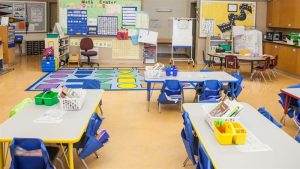Teacher shortages not as severe in suburban Cook schools
By Sarah Mansur Capitol News Illinois — March 5, 2021
Mark Klaisner, president of the IARSS and director of the West 40 regional school district in Hillside, said the schools in suburban Cook County and the northeast region face a less severe teacher shortage problem than some downstate areas.
A shortage of teachers in Illinois public schools isn’t quite as severe in the suburban Cook County districts that participated in a new study from a regional superintendents group.
While two-thirds of the 67 districts that responded to the survey indicated at least a “minor” problem with filling teaching positions, the percentage is lower than it is statewide (77 percent). The findings are part of the 2020 Illinois Educator Shortage Study, which will be released Monday by the Illinois Association of Regional Superintendents of Schools.
Seven regions were established for the study. Teacher shortages are most severe in the west central Illinois region, where 89 percent of school superintendents indicated at least a minor problem. The southwest (87 percent), southeast (84 percent) and east central (84 percent) regions were also above the state average.
Mark Klaisner, president of the IARSS and director of the West 40 regional school district in Hillside, said the schools in suburban Cook County and the northeast region face a less severe teacher shortage problem than some downstate areas, in part, because they have greater local revenue streams and thus are able to offer higher salaries.
“We have less of a problem attracting talented teachers and administrators, and some of that is money (in the school system), and salaries,” Klaisner said.
In Illinois, many school districts receive nearly two-thirds of their funding through a portion of local property tax revenues, which rely heavily on real estate values and population density.
Klaisner said the region’s proximity to a metropolitan area also helps draw teachers and administrators.
Of the 853 school districts in the state, 591 districts responded to the IARSS survey and only 47 percent of suburban Cook County schools responded.
Nine percent of responding school superintendents in suburban Cook County described the teacher shortage problem as serious, while 19 percent described the problem as major.
Of 5,414 total posted teacher positions statewide, 938 of those positions, or 17 percent, were unfilled or filled with less-than-qualified hires, school districts reported.
Among survey respondents, 62 percent of districts in suburban Cook County reported having fewer qualified applicants for teaching positions in 2020 than in previous years, and 77 percent reported expecting serious to minor teacher shortages in the coming two years.
Statewide, teacher shortage issues in schools resulted in 257 classes canceled and 195 classes converted to online instruction in the past year, the study found.
Of the 67 school districts in Cook County that responded to the survey, only six canceled classes and only four converted classes due to teacher shortage problems. Overall, 16 classes were canceled and 13 moved online.
While suburban Cook County schools aren’t having quite the same difficulty in hiring teachers as the rest of the state, its difficulties in filling substitute teaching positions is more on par with the statewide problem.
Klaisner said substitute shortages are also a growing issue for schools in suburban Cook County, with 88 percent of superintendents responding that the problem is worse than it was five years ago and 93 percent of districts reporting at least a “minor” problem. Of the survey’s respondents, 73 percent in the county called the shortage of substitute teachers a “serious” or “major” problem.
Klaisner said many school districts in his region employ substitute teachers who are retired instructors who wish to continue teaching on a limited basis.
“Older retired teachers were more subject to concerns during COVID, and so the substitute pool dropped as well, which was something that many districts were relying on,” he said.
Statewide, 93 percent of districts reported a substitute teacher shortage problem and 86 percent reported the problem is worse than in years past.
The IARSS study recommends that state education leaders “collaborate to develop robust and targeted educator pipeline programs and/or statewide incentives that address educator shortages in a systemic and sustainable way.”
Recommendations to the General Assembly and state leaders also include a state-sponsored loan forgiveness program for teachers and leaders who work in the most hard-to-staff schools, positions and areas of the state.
The study also proposes that the Illinois General Assembly consider changes to the Teachers’ Retirement System that could provide further incentives for people to enter the teaching profession.
smansur@capitolnewsillinois.com







